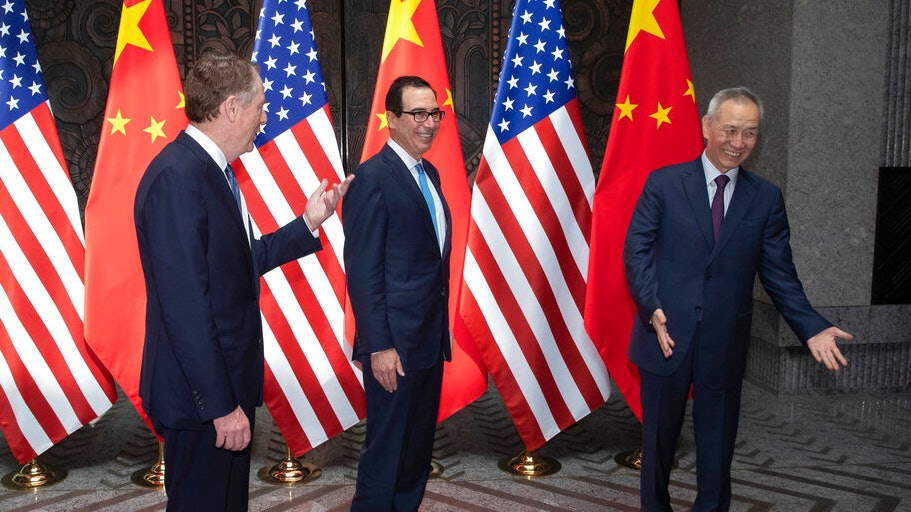From July 30 to 31, the Chinese delegation led by US Trade Representative Wright Heze and Treasury Secretary Mnuchin and the Chinese Vice Premier Liu He led the 12th round of trade negotiations in Shanghai. Although the negotiations have achieved some small consensus and results, in comparison, after three months of confrontation, neither side hopes to make a breakthrough in the Shanghai negotiations.
The two sides only adjusted their postures and positions, showed goodwill, and returned to the state before the collapse of negotiations three months ago as a new starting point. This is the biggest achievement of the Shanghai negotiations.
Overall, this round of Shanghai negotiations highlighted three “low”.
Low posture
After more than ten rounds of negotiations, the teams on both sides are old friends. They don’t need to use the various public opinions before the negotiations to cheer for one’s own side. They don’t need to make too many false accusations, add unnecessary noise to the negotiations, and affect both sides. The atmosphere of negotiation. However, the biggest variable since the Sino-US trade war, US President Donald Trump consistently “threatened” China. On July 30, the day when Lightheze and Mnuchin arrived in Shanghai, Trump issued a warning to China: “If you win the 2020 election, waiting for China will be even worse.”
The most different is that the hawkish forces in the US trade negotiations have also lowered their posture and tone. Trade representative Robert Lighthizer and trade consultant Peter Navarro have never published any fierce or tough rhetoric after the Osaka Summer Fair, but more catered to the main talkers in the team. Emphasize China’s commitment to timely purchase of US agricultural products.
Of course, there is also the “drag and tear” of the United States behind this. That is, the United States has been accused by the Chinese government of being slow and sincere in its partial or complete ban on Chinese enterprises. Therefore, during the Shanghai negotiations, most of the official Chinese media emphasized the voice of “China does not give in, the United States should show sincerity.”
Expected low
This can be seen from the US statement before the negotiations. White House economic adviser Larry Kudlow made it clear that the Shanghai talks do not expect to reach any big agreement, the focus is on an “adjustment” of the negotiations between the two countries to return to the state before the trade negotiations collapsed in May. He stressed that the main task of the US is to clarify China’s “goodwill” commitments, prompting China to actively implement it, and help the United States achieve trade balance by purchasing large quantities of US agricultural products and services. Judging from the public opinion after the negotiations, the two sides touched the old issues, and some of them focused on the purchase of agricultural products. As for structural problems such as compulsory technology transfer and intellectual property theft, no major progress will be made.
Moreover, in addition to requiring the United States to fulfill its promises and completely lift the ban on Huawei, China also opposes the phased elimination of tariffs. The US team insisted that the phased implementation, retention of some tariffs and new tariff threats will help to increase pressure on China, which is a bargaining chip to reach an agreement in favor of the United States. This disagreement will not be bridged, and negotiations between the two sides will inevitably lead to a stalemate. Coupled with the conflicts between the political agendas of China and the United States, it seems that the difficulty of reaching an agreement with each other is also increasing. Trump has made it clear that China is waiting for the Democratic president to take office after the end of the 2020 US election.
Low standard
The Shanghai talks are entirely negotiations between the two sides before the resumption of the meeting of the heads of state, re-calibrating each other’s negotiating goals. For China, the main appeal is to let the United States honor the promise of lifting the Chinese company Huawei and prevent remorse at other agreements. For the United States, the main appeal of the Shanghai negotiations is to buy American agricultural products before Beijing. The promise of service is “reconfirmed”, which is a short-term negotiation commitment for Trump and an important basis for continuing to talk with China.
In the previous trade negotiations, the United States set a high standard and threshold, and the initial list of wishes was almost beyond imagination, even to the point of forced extortion. As long as it does not talk about collapse, as long as it is not a temper, or a disappointment, it is a successful negotiation in Shanghai. This low standard is to let the two sides return to the position of May and re-present the willingness to negotiate and reach an agreement. It remains to be seen whether this willingness is the “American sincerity” that China expects.
Finally, the choice of Shanghai in negotiations is also in line with this “three lows.”
On the one hand, China also hopes that the United States will have more commercial or business perspectives in the negotiations, and less political annoyances; on the other hand, how to achieve major breakthroughs or achievements in Shanghai will give Shanghai a different symbolic meaning. In fact, China and the United States do not need to give Shanghai any additional historic labels, because Shanghai’s important position in the history of Sino-US diplomacy does not need to be re-emphasized through such negotiations. Therefore, through the Shanghai negotiations, China mainly hopes that the trade negotiations between the two sides will be “less politics and more business.”












